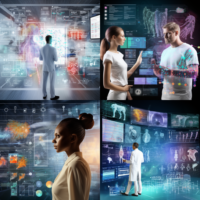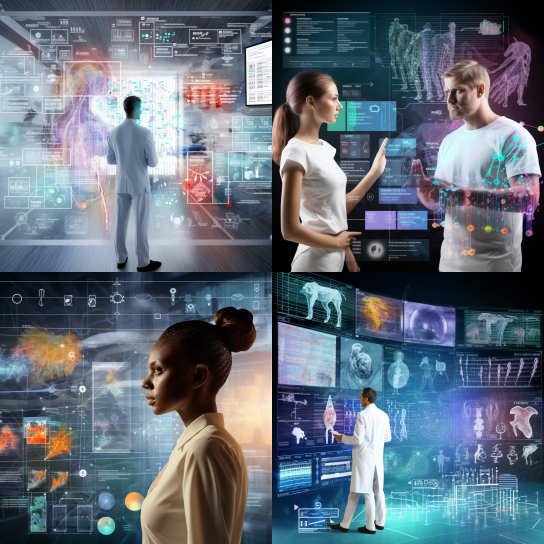Applications of AI in Healthcare

Applications of AI in Healthcare
AI In Healthcare
Artificial intelligence (AI) has already begun to transform the healthcare industry, with its applications being used to improve patient outcomes, increase efficiency, and reduce costs. AI is a set of technologies that enable machines to learn from data, make predictions and decisions, and perform tasks that would typically require human intelligence.
#1. Use Machine Learning Algorithms
One of the most significant applications of AI in healthcare is the use of machine learning algorithms to analyze large amounts of patient data to identify patterns and make predictions. This approach can help physicians to diagnose diseases earlier and more accurately, as well as to identify the best treatment options for individual patients. For example, AI can be used to analyze medical images such as X-rays or MRI scans, helping radiologists to detect abnormalities and diagnose conditions like cancer.
#2. Development of Personalized Treatment plans
Another important application of AI in healthcare is the development of personalized treatment plans. By analyzing large amounts of patient data, including genetic information, medical history, and lifestyle factors, AI algorithms can identify the most effective treatments for individual patients. This approach can help to improve patient outcomes and reduce the likelihood of adverse side effects.
#3. Monitor Patients in Real-time
AI can also be used to monitor patients in real-time and alert healthcare providers to potential issues. For example, wearable devices can track vital signs and other health indicators, with AI algorithms analyzing the data and identifying any anomalies. This approach can help healthcare providers to intervene earlier and prevent complications.
#4. Chatbots and Virtual Assistants
Another application of AI in healthcare is the development of virtual assistants or chatbots. These tools can help patients to access medical information and receive support and guidance without having to visit a healthcare provider in person. Virtual assistants can also help to triage patients, directing them to the appropriate level of care.
#5. Administrative Tasks
AI can also be used to automate administrative tasks, such as scheduling appointments and processing insurance claims. This approach can help to reduce administrative burdens, freeing up healthcare professionals to focus on patient care.
#6. Drug Discovery and Development
AI can also be used to improve drug discovery and development. By analyzing large amounts of data on drug compounds and their interactions with biological systems, AI algorithms can identify potential new treatments more quickly and accurately than traditional methods.
#7. Improve Clinical Research
AI can also be used to improve clinical research. By analyzing large amounts of clinical trial data, AI algorithms can identify patterns and insights that may not be apparent to human researchers. This approach can help to accelerate the development of new treatments and improve patient outcomes.
#8. Providing Decision Support
Finally, AI can be used to improve the quality of healthcare by providing decision support to healthcare providers. By analyzing patient data, including medical history and test results, AI algorithms can provide recommendations for treatment options and dosage levels. This approach can help to ensure that patients receive the best possible care.
AI has the potential to transform the healthcare industry by improving patient outcomes, increasing efficiency, and reducing costs. From drug discovery to clinical decision support systems, the applications of AI in healthcare are wide-ranging and varied. As AI technology continues to advance, we can expect to see even more innovative uses of this powerful tool in healthcare.


Leave a Reply